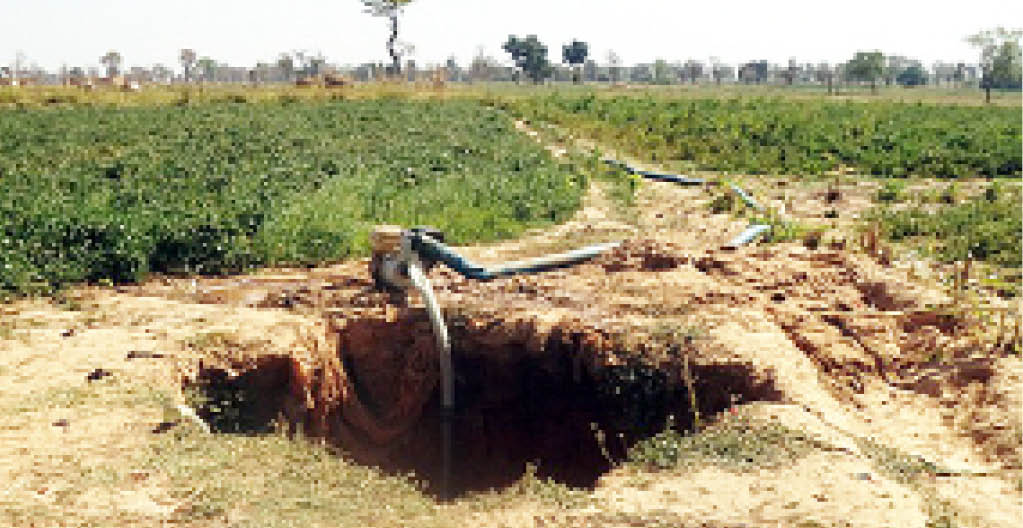Shortage of water and other irrigation facilities has continued to pose serious threat to dry season farming in Nigeria, Daily Trust investigation has shown.
This is even as the federal government said there are close to 250 dams across the country holding a huge volume of water.
- FG expands access to cooking gas for rural dwellers — Kyari
- FCT: Don’t take law into your hands, CP warns farmers, herders
Experts and stakeholders in the agriculture sector believe the federal government’s diversification and food sufficiency policies would not achieve the desired results if the nation’s attention remain solely on wet season farming.
Mr Kayode Ijaya, an agriculturist, said the prevailing unpredictable climate condition has made all-year-round farming imperative.
“Look at what happened in the South-West during the last farming season.
“This is the region usually noted with abundant rainfall but the rains ceased shortly after planting last year thereby leaving many crops destroyed.
“Also in the North, flood washed away many farms, especially rice farms.
“So, there is no way we can continue with one season farming.
“With dry season farming, farmers can control their water requirements to a large extent,’’ he said.
What went wrong with our irrigable land?
The Minister of Water Resources, Engr. Suleiman Adamu, has said the federal government has over 200 dams across the states of the federation aside from state-owned ones.
He told our Agric Editor that the dams were capable of providing water for all the irrigable lands across the country as well as for domestic use, but that many state governments had failed to either reticulate the water or provide the necessary irrigation facilities for farmers.
This, he said, was the major reason many of the lands in the states were either laying fallow or not being used for dry season farming at all.
“The state governments need to be on the same page with us.
“We have provided the body of water and they are free to provide irrigation facilities near the dams and reticulate the water for farmers and even to the various households,’’ the minister said.
How dry season farmers are struggling for water
Due to the absence of irrigation facilities, dry season farmers in states are devising manual ways of scooping water to feed their farms.
Our correspondent in Katsina reports that farmers in the state mostly relied on wells and tube wells as their major sources of water for irrigation activities.
Katsina State is one of the major producers of tomato, bell pepper, chilly, onions, cabbage, Irish potato and wheat but for about four years now, some farmers have been struggling with water for their crop production.
Alhaji Nasiru Dantankari, a large-scale tomato farmer at Dantankari of Dandume LGA said: “we virtually no longer have a dam because, for over 10 years now, the one available has not sustained the volume of our tomato production. Dug and tube wells are our major water sources and because we have been using them for long, some are now exhausted.”
Another farmer in the area, Abdullahi Hayatu, said the only intervention they direly need from the government is dam rehabilitation.
“Over 10 truckloads of tomato leave here daily and we sponsored the entire cost of production, including the provision of water.
“Our dam has dried up. The rehabilitation of the dam, if carried out, will boost economic activities in the area,’’ he said.
In Benue, farmers’ inability to engage in dry season farming has largely been blamed on the near absence or decaying irrigation facilities.
Our correspondent also gathered that where the decaying irrigation facilities existed, the farms were not close enough to access water.
A farmer in Otukpo, Adakole Audu, noted that lack of irrigation facilities where he farms has discouraged him and other farmers in the area from going into dry season farming over the years.
Audu said they depended solely on rain-fed agricultural activities in the area, noting that would hamper food sufficiency and also limit the income generation and improved living of farmers.
In Gboko, a female farmer and chairperson of the Yam Farmers Association in Benue State, Mrs Scholarstica Amua, said most streams dried up after the rainy season, making it difficult for farmers to access water for their crops.
She said farmers had to get water from distant streams to engage in dry season farming since irrigation facilities were not located near their farms.
The chairman of the All Farmers Association of Nigeria (AFAN) in the state, Aondongu Saaku, in an interview with our correspondent, said irrigation farming had not been given attention by successive governments in the state.
Another farmer and former chairman of AFAN, Hembe Kula, in an interview recently said: “We can’t do dry season farming very well despite the River Benue that is at our advantage.”
Our correspondent in Kano reports that out of the two mega dams in the state, only Tiga has been committed to irrigation and it has been the only dam used for irrigation by about six local government areas.
But a farmer in Bunkure LGA said the authorities overseeing the dam had shut down the water supply to some areas thereby causing serious concern to farmers in the past two months.
“We were told the water channels will be shut down for repairs; we never knew it would be this long.
“This is the right period for dry season farming activities but we are yet to start anything up till now,” he lamented.
Another farmer at Kadawa irrigation site in Garun-Malam, Malam Shehu Mairiga, revealed that tomato farmers in Kano State may likely not plant this dry season due to lack of water as a result of the canal’s closure.
When contacted on the issue, the Public Relations Officer, Hadejia Jama’are River Basin Development Authority (HJRBDA), Salisu Ibrahim, said the dredging of the water canals was under the World Bank assisted programme of Transforming Irrigation Management in Nigeria (TRIMING), a project aimed at improving agricultural services delivery and productivity.
He said because of the impact, the authorities decided not to close all the canals, thereby ensuring that others continued with their farming activities.
Meanwhile, in Plateau State, the absence of irrigation facilities around the Lamingo Dam is preventing farmers in Jos from fully engaging in dry season farming.
Our correspondent in the state, however, reports that some farmers had to resort to pumping machines to convey water from the dam. The situation has forced them to limit the sizes of their farms, a farmer, Gimbiya John, who owns a pumping machine, said.
Gimbiya said she had a pumping machine but did not have pipes or hose to channel water to her farm and so had to rent from other colleagues.
Farmers with no pumping machines usually paid between N500 and N1000 to rent from their colleagues.

 Join Daily Trust WhatsApp Community For Quick Access To News and Happenings Around You.
Join Daily Trust WhatsApp Community For Quick Access To News and Happenings Around You.


